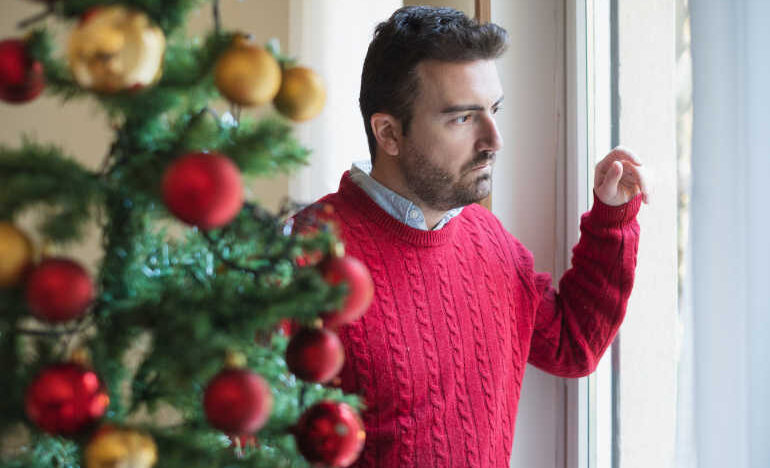Christmas and Depression, an Assembling God’s Puzzle video

Christmas is right around the corner — the most wonderful time of the year.
At least that is what we are told by our culture.
- We see commercials of people buying each other gifts right and left (like the married couple who buys each other a car without telling the other ahead of time).
- We see all the warm and comforting Christmas shows where Santa always comes through, and Jimmy Stewart is saved from suicide and bankruptcy by his angel and neighbors.
- We see scenes of perfect “Norman Rockwell families” coming together around the perfect dinner table, overjoyed at being together as Dad carves the turkey.
- And of course, we retell the heart-warming nativity story of baby Jesus, and our kids dress up as Mary and Joseph for the church Christmas play, and we sing of peace on earth. It all appears very wonderful.
But according to mental health agencies and therapists, more people report feeling depressed at Christmas time than almost any other time of the year. Why would that be?
One reason is that it is the time of year when the weather turns cold, and people have to deal with ice and snow and being couped up inside. Plus, it is cold and flu season, not to mention Covid. It is also the time of year when there is the least sunlight. Many people suffer from SAD (Seasonal Affective Disorder) due to lack of sufficient sunlight.
Some have lost loved ones since last year, and are dealing with grief and sadness at not being with the loved one this holiday season. Then there is the stress and anxiety related to all the extra activities that come with the season — the shopping, cooking, Christmas parties, family gatherings, decorating, etc., etc. Buying gifts for everyone on our list can result in financial strain and worry, which can lead to depression. A person may see all the “perfect” families on TV and feel inadequate since their family isn’t so perfect. And when everyone is wishing each other a Merry Christmas and looking Merry on the outside, and I’m not feeling merry, I may feel even worse because I think there is something wrong with me.
Depression at Christmas is a piece of the puzzle that many of us need to situate in our lives in some way. There are some things to try that may help. One strategy is to simplify where possible. That may mean buying simpler, less expensive gifts for people. Just spending time with loved ones and being attentive can be a precious gift that we can give. If I’m feeling inadequate because I don’t resemble the “perfect,” successful people on TV, I can donate my time or resources to those in need. Helping others can be a great mood enhancer.
Maybe we don’t have to do all the family holiday traditions that we always do. Maybe focus on just a couple and make them extra special. Some people spend many hours and much money on decorations and stringing thousands of lights all over the house. A few well-placed, beautiful decorations can be just as beautiful.
If I’m grieving the loss of a loved one this Christmas, maybe it would help to share those feelings with someone so the feelings don’t just stay bottled up inside. It can help to re-evaluate our “to do list,” crossing off some of the less important items, and scheduling in some “self-care” things like quiet time, prayer, or exercise. And it is always good to remind one’s self that there is nothing wrong with me if it seems I’m the only one that isn’t “merry.”
Our world doesn’t magically change because of Christmas. Reminding ourselves of that, and continuing to do those self-care things that work for us is the best way to reduce the stress, anxiety, and depression that often accompany the Christmas season.
Here’s wishing you a more peaceful and Spirit-filled Christmas.
All of the videos in this series can be found here: Assembly God’s Puzzle.
Never miss an article published on the Renewal Center website: Sign up to receive our newsletters.
[Fr. Garry Richmeier, a Precious Blood priest and spiritual director, holds a Master’s of Divinity Degree from St John’s University in Collegeville, Minnesota, and a Master’s of Counseling Psychology degree from the University of Missouri-Kansas City. He is a licensed professional counselor and a licensed marriage and family therapist.]
This piece was originally published on Dec. 14, 2022.
Photo 130605892 / Christmas Depression © Tommaso79 | Dreamstime.com
We’d Like to Hear from You!
We’d like to know what you think about this article. Send us a comment using the form below. Do you have a suggestion? Is there something you want to learn more about? Send us a note.
Related

Making a Banner for Lent Part 2
A Coffee with Padre Video
Fr. Timothy finishes his Lenten banner and continues his reflections on how colors and materials become potent symbols that bring the Lenten season alive. The final banner serves as a visual reminder of our spiritual journeys.

Lent Video Four — Guided Meditation: ‘Traveling in the Dust of the Rabbi’
In this video, Fr. Ron reads the Gospel, Mark 1:29-34, for you and then leads you through a guided meditation, taking you deeper into that story. He calls this experience “an example of traveling in the dust of the rabbi.”
Categories
Assembling God's Puzzle Coffee with Padre Cooking & Spirituality Encounters of the 4th Kind Family Matters Reflections on the Eucharsitic Prayers Spiritual Resources Taize Prayers The Contemplative Life Traveling with Pilgrims of Hope Uncategorized Videos Week of Prayer for Uhristian Unity When you need a little help
